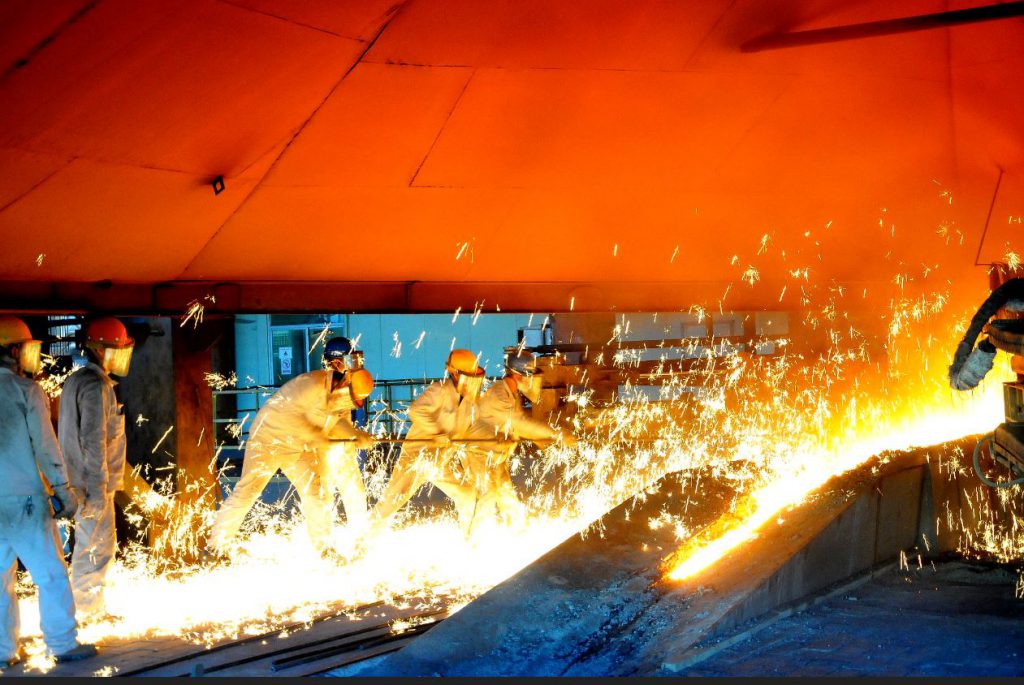
Nickel pig iron plant in Indonesia.
Indonesia will limit construction of nickel smelters to ensure new plants produce high-value products and follow green principles in the production process, state news agency Antara reported on Friday, citing the country’s investment minister.

Noting many existing smelters already produce nickel pig iron or ferronickel, Minister Bahlil Lahadalia said Indonesia needed to prioritise using ore reserves to create higher value materials including input for batteries for electric vehicles.
“Now we prefer to push downstreaming with 80% to 100% value addition,” he was quoted as saying.
Nickel pig iron and ferronickel typically contain up to 40% of nickel.
Indonesia banned exports of unprocessed nickel ore in 2020 to promote development of nickel smelting at home.
The government has said that the export value of processed nickel products last year was estimated at $30 billion, or ten times higher than the export value of nickel four years ago.
Smelters in Indonesia often use coal as a source of energy and the minister said that new smelters should be powered by green energy without giving further details.
“Looking forward we will limit development of smelters that are not oriented towards green energy,” Bahlil said.
He did not provide a timeline for the policy. The Investment ministry did not immediately respond to a request for comment.
Previously, a senior official at the energy ministry said that Indonesia’s high-grade nickel ore reserve will only last less than two decades if there are no restrictions on smelter construction.
As of 2021, Southeast Asia’s biggest economy had 15 nickel smelters, a government official previously said.
(By Stefanno Sulaiman; Editing by Fransiska Nangoy and Ed Davies)
Indonesia Challenges China With $3 Billion Offshore Gas Project
- Last week, the Indonesian government approved a $3 billion development plan for the Tuna offshore natural gas field.
- The field lies between Indonesia and Vietnam, meaning the development will involve the Indonesian navy and will have serious geopolitical implications.
- Although China does not have a claim to the field itself, it does have fishing rights nearby and is notoriously protective of all its claims in the South China Sea.
Last week, Indonesia's government approved an offshore gas project with a price tag of over $3 billion. On the surface, that's just business as usual. Below the surface, the move is a direct challenge to China's territorial claims because the gas block is in the South China Sea.
The Tuna block, Reuters reported last week, lies in the waters between Indonesia and Vietnam. The Indonesian oil and gas regulator, SKK Migas, says the block could see peak production of 115 million cubic feet daily by 2027. The gas will be exported to Vietnam, per an earlier statement by the Indonesian energy minister.
"There will be activity in the border area which is one of the world's geopolitical hot spots," the chairman of the oil and gas regulator, Dwi Soetjipto, said. "The Indonesian navy will also participate in securing the upstream oil and gas project so that economically and politically, it becomes an affirmation of Indonesia's sovereignty."
The challenge, then, is a perfectly deliberate decision that could put Indonesia on a collision course with China, with the latter known to flex its military muscles in the South China Sea whenever another country in the basin dares try to establish a presence for oil and gas production purposes.
Related: $4.2 Billion Oil Tanker Merger Falls Through
The South China Sea is seen by many, including in China, as a vast untapped oil and gas reservoir. The U.S. Geological Survey in the 1990s estimated these reserves at some 28 billion barrels of crude, but a 2019 report by the U.S. Energy Information Administration put these at 11 billion barrels, both proven and probable.
Natural gas reserves are also quite significant, at an estimated 190 trillion cubic feet, per the EIA, also proven and probable. But there may be a lot more oil and gas in as-of-yet undiscovered deposits under the waters of the South China Sea, according to a USGS study from 2010. To be more precise, the USGS estimates these at between 5 and 22 billion barrels of crude and 70 and 290 trillion cubic feet of natural gas.
Now, as the EIA notes in its report about the South China Sea reserves, most of the discovered oil and gas is in undisputed waters. This, however, is not really the case with the Tuna block, which lies near the Natuna Islands.
Although China does not have a claim to the islands themselves, the Wall Street Journal reported this week that it does have a claim to part of the waters around them, including fishing rights. And there have already been clashes between Indonesia and China in this area.
In 2016, the WSJ recalls, Chinese coast guards stopped the Indonesian authorities from detaining a Chinese fishing boat in the waters around the Natuna Islands. Then, in 2021, when the Indonesians sent a rig to the Tune block for some exploratory drilling, the Chinese sent the coast guard.
According to an exclusive report by Reuters from that time, Beijing had also demanded that Jakarta stop drilling in the block because its ownership is under dispute. Jakarta, however, refused. Drilling at the Tuna block ended successfully.
The situation, however, is tricky. As Reuters noted in its 2021 report, China is Indonesia's biggest trade partner and the place where a lot of investments in Indonesia come from. Yet Indonesia also considers the development of fields like the Tuna a strategic goal. And, apparently, it is ready to confront its bigger, intimidating neighbor to advance that goal.
"While China may return for another round of harassment, I don't expect Indonesia will be cowed by anything short of physical force," the director of the Asia Maritime Transparency Initiative, Gregory Poling, told the WSJ. The question, then, is whether China is prepared to use physical force to advance its claim to most of the South China Sea.
No comments:
Post a Comment